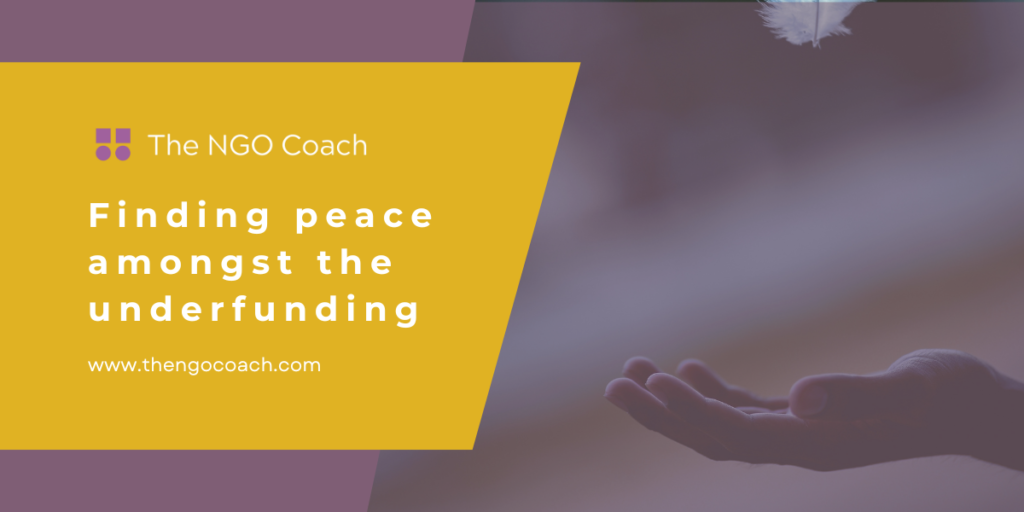Do you find some downtime in your busy, under-resourced, and under-funded NGO life? I’m figuring the answer is most likely a ‘no’. You’re not alone. Even though NGO leaders are some of the most creative, resourceful, and innovative people around (hey, we’ve had to be), we can also become very addicted to ‘busy-person syndrome.’ Do you want to find peace amidst the ongoing underfunding your organisation might struggle with?
Here are some of the things that have worked for me to build a much more peaceful and relaxing co-existence with the world (and myself):
Taking Mini-Breaks During The Day
I used to get so focused that I could work with my head down for multiple hours, churning through the many things on my to-do list like a wild thing. Oh, the sense of accomplishment! But I would be a static, unmovable being staring at my computer. It’s so bad for my eyes, brain, nervous system, joints, and muscles. As humans, we were made to move consistently. Now, I’m trying to be much more mindful of short and sharp industrious work, coupled with stepping away, relaxing, stretching, and getting out into nature more often. It’s helped my ongoing attempts to downregulate and spend much more time in the ‘rest and digest’ state.
Scheduling a Close-Out Time
With a large work schedule as an NGO leader, I always worked over my regular hours like most others. It would be 4pm, then suddenly 7pm. Or I needed to finish something off and it was suddenly 8pm. The longer I stayed, the more out-of-it I would get. I’d forget I’d be hungry (or grab a quick filler snack). I’d forget my brain was overloaded and needed to rest and process. I’d forget that other parts of my life also needed investing in. I’d forget to get out into nature. When I finally signed out for the evening, I’d be positively braindead with little energy to do anything else. I’ve had to learn to live with ambiguity and now I break up my workday into more manageable chunks (2 hours maximum in one go). I’m working to train myself to decide when I will sign out and stick to it.
Having Clear (Mostly) Immovable Boundaries
Being flexible and adaptable has been a good trait during my NGO career. However, like all things, there can be a negative side. I often found myself being OVERLY flexible, adaptable, and going above and beyond where I should. Instead, I needed to build much clearer boundaries. Learning to say ‘no’ to things. Delegating things to someone else. Setting up evening events in my calendar meant I must sign out at a certain time. Recognising I couldn’t be all things to all people. Learning that my contribution to the community was just one part of a greater whole. Things could wait until tomorrow, the next day, next week, or even never! I was not in charge of the world, and it wouldn’t end without me (the end of martyrdom!).
Digital Detoxing
Getting off the digital devices was the first step to downregulate my nervous system. So much of my life exists on my phone – not just work but social connections, camera, notes, health apps, banking, recipes, maps, online shopping, etc. Do I need to access all the things, all the time? No! I now think of my phone as mostly only needed during ‘work hours’ (9am-5pm). If I pick it up for something outside of these hours, e.g., answering a call, I’ll attempt to put it back down and walk away afterward mindfully. I’ll also be honest and own up to this not always working! I do stick to not usually knowing where my phone is for the last 2 hours of the day. It’s a journey, and we all have our ups and downs. I’m no longer so hard on myself.
Discovering New Hobbies and Fun Things to Do
When I left my full-time NGO role, I had to think hard about what I used to do before I was so tired and overworked. It seemed that my old hobbies no longer existed. I’ve spent the past few months starting to build in new, fun, social, and relaxing activities. I particularly enjoy my regularly scheduled social times. I like a Sunday afternoon cook-up for the week ahead. I’m still working on regular walking. I’m trying to commit to a movie every Monday night (cheap night!). I’ve recently joined the local Timebank and volunteered to do some baking for local charities.
Let’s face it—if you’re an NGO leader, your organisation is unlikely to suddenly offer you space to prioritise your well-being. The high-stress environment will continue. You’re not going to double your kaimahi / staff numbers. Underfunding and under-resourcing are going to continue. It will always feel like there’s never enough to do the amount of mahi / work you need to achieve. The only thing you truly have control over is YOU!
You must prioritise your personal care over your community care. To stay healthy and well and continue to be the incredibly competent NGO leader you are, you need to ‘feed’ yourself first. Call it peace, downtime, quiet time or whatever you want—you matter most! Don’t forget that.
Missed other articles in this series?
Building a personal support network

